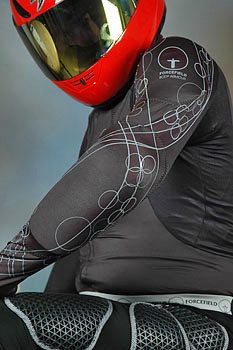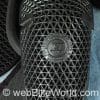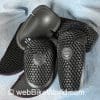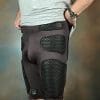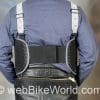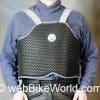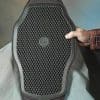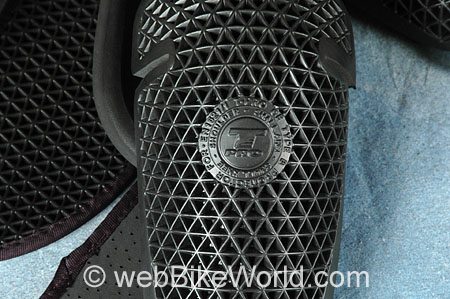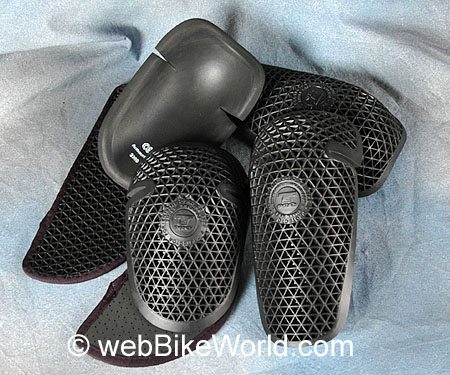Many of you are still responding to the series of motorcycle armor review articles we’ve published over the last year or so.
Although we knew it all along, this just proves that webBikeWorld visitors are extremely knowledgeable — and concerned — about safety.
This pleases us to no end, because we’ve been on a continuous crusade for motorcycle safety since the site was started about seven years ago.
We started our journey into the world of protective motorcycle clothing with a look at the Bohn Coolguard system.
I guess you could call that “armored motorcycle underwear”.
Padded motorcycle underwear is probably a more accurate term, but has, uh, other connotations.
The underwear is actually just a carrier to hold the armor in place and not really a full-functioning undergarment.
The idea is that the stretchy and tight-fitting fabric holds the padding and armor close to the rider’s body exactly where it can offer the best protection upon impact.
I’ve found that if you can live with the extra time and effort it takes to wiggle in and out of it, the underwear has the potential of offering much better protection than the sometimes flimsy and almost always too-loose-fitting armor and padding sewn inside motorcycle jackets and pants.
We’ve also covered (if you’ll pardon the pun) a variety of back protectors, armored shirts and more — click through the various links in the column on the right to learn more.
And here we are, back to armored motorcycle underwear again!
This time, we have a huge box full of Forcefield TPro Armourflex body armor (or “armour”, as it’s known on the other side of the pond).
The Forcefield name is well known in Europe and the products are also becoming popular in the U.S.A.
Although many retailers still sell the armor under the TPro brand name, Davies Odell (the company that manufacturers the products) refers to the product only by the Forcefield name.
The TPro brand name was apparently used for the technology in the protectors, but Davies Odell now uses the “Armourflex” label instead.
The bottom line is that the protectors are simply referred to by the brand name “Forcefield”, so that’s the name we’ll use.
Forcefield armor has become popular for a several reasons, including a 2005 RiDE magazine (UK) “Best Buy” designation after having passed their back protector comparison tests with flying colors.
The Personal Protective Equipment Directive
Forcefield armor was also one of the first “soft” types of motorcycle protective armor, offering potentially better flexibility and comfort to street riders than the typical “hard” back protectors and other types produced by much of the competition.
Also, the Armourflex (aka TPro) technology was also one of the first that met the tougher European Level 2 compliance standards for personal protective equipment (PPE) in Europe.
Level 2 compliance means that the protector has the potential of transmitting less of an impact to the rider during a fall.
Note that the product must have the official CE mark (Certificate of European Conformity) showing compliance to Level 2 of the European Personal Protective Equipment directive and it must be tested in an independent lab, using the EN1621-2:2003 conformance testing standard specifications.
Understanding the various standards, technical terms and other jargon can make one’s head spin, but it’s important to get it right if you’re really looking for the best available protection.
If you’re really interested, the Forcefield website has some information about motorcycle armor and protectors. Although there’s an obvious conflict of interest, they do a pretty good job at explaining what’s important.
Also, one of the best articles I’ve read on the subject is on the British Motorcycle Federation site.
The article is entitled “Personal Protective Equipment (PPE) For Motorcyclists – A Briefing From The British Motorcyclists Federation“, and it discusses the history of protective equipment and conformance standards.
Forcefield Armor Technology
But that’s neither here nor there — the bottom line is this: there are really only three things motorcyclists need to be worried about: 1) Does it work; 2) Is it comfortable and 3) How much does it cost?
Although no one has yet volunteered to jump off their bike at 60MPH to give it a try, we’ll have to take Forcefield’s word for it on the “Does it work?” question.
With regards to comfort, we did claim in our review of the original TPro Forcefield back protector, that it is “the most comfortable and least obtrusive back protector we’ve tried”. And as for cost? Well, that’s up to you to decide.
There’s no question that the Armourflex technology used in the Forcefield protectors is different.
It’s thinner and more flexible than almost all of the competition and it gets its protective qualities from both the “waffle” texture molded into the material and the composition of the material itself.
Forcefield claims that Armourflex allows the impact force to be distributed more evenly across the surface.
That is unlike (they claim) other types of padding that can offer substandard levels of protection, depending upon the exact location of the impact on the armor.
One of the benefits of Armourflex is the holes that are formed into the junction of each “X” in the waffle grid.
This theoretically provides more air flow than other types of back protectors. Granted, none of them are going to keep the rider as cool as he or she would be without armor, but at least the Forcefield products do offer the prospect of better air flow.
Another potential advantage of the Forcefield armor is its ability to withstand repeated impacts.
Some or most of the other brands of armor can deform after one sharp blow, which can reduce its ability to distribute additional impact force that might be applied to the affected area.
Note that I’m not using the term “absorb” to describe what happens during an impact.
The protectors or armor don’t really absorb the force; rather, the material is designed to slow the rate at which the force is transmitted to the rider.
Forcefield uses a good analogy to describe this: “A direct knee impact with the hard surface of the road or ground is sharp and sudden, but a good impact protector compresses slowly between you and the ground and spreads out the energy over a longer time. Thus the protector reduces injuries.
Your kinetic energy still passes to the ground, but slowly enough to not injure you or to dig a hole! The differences in timescales involved are measured in milliseconds, but a millisecond is a long time in the world of impact protection!”
AA Variety of Options
The good news is that the interest and response from the motorcycle community regarding proper riding gear has encouraged the manufacturers of protective armor to develop all sorts of interesting options for actually wearing the stuff.
A motorcyclist can customize his or her protection as required, even augmenting the armor that comes with their jackets or pants by adding kidney, rib, lumbar, shin, elbow and even head protectors to the mix.
But choosing the best combination can be confusing. The basics include shoulder protection, elbow and forearm protection and knee and shin protection.
One could probably make an argument that back protection is more important than anything else, but it’s often overlooked. After that, there’s rib protection (important for dirt riders) and don’t forget the thighs, coccyx and chest.
So let’s take a look at this potpourri of personal protective products!
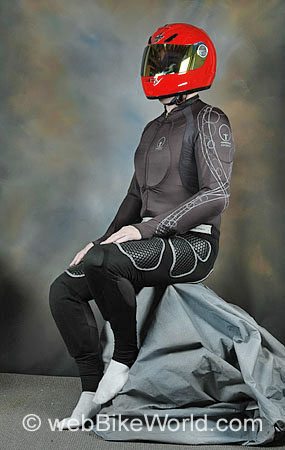
Forcefield Action Shirt
Armored shirts are popular with many motorcyclists.
An armored shirt can make the rider look buff (a joke, folks) while offering a potentially higher level of protection then the armor that is provided in the typical motorcycle jacket.
Unless the motorcycle jacket I’m wearing fits correctly (that is, very tight) and has quality armor, I usually depend on an armored shirt for protection.
I’ve recently tossed the armor in one of my jackets and I wear the Forcefield shirt instead; it’s not only more comfortable, but the jacket fits better over the Forcefield shirt than it did with the original flimsy armor that it came with.
The Forcefield Action shirt uses a different type of fabric than the mesh in the BBohn Coolguard system. Forcefield uses a combination of stretchy Lycra with DuPont Coolmax behind some of the padding and in the flex points.
Lycra doesn’t flow as much air as the mesh, but it seems sturdier and makes it slightly easier to enter the shirt.
Forcefield includes a large section of what I assume is Coolmax fabric mesh under each arm, extending down along the ribs and another narrow section along the back of the arm along the back.
One of the problems with this type of close-fitting, stretchy underwear is that the rider must take great care putting it on and taking it off.
It’s easy to jam your foot into the wrong place or grab and pull a leg in the wrong spot, which can cause the seams to tear. It’s better to put it on and take it off slowly, moving small areas of fabric at a time.
The Forcefield shirt uses removable Armourflex in the shoulders, for the elbow and forearm and a couple of smaller sections on each side of the chest.
The armor must be inserted by the owner when the package arrives; it fits into the pockets sewn into the inside of the garment.
The armor can be removed when it comes time to wash the shirt.
Forcefield says that a triple layer version of Armourflex is also available, but I can’t find it listed on their website, so I’m not sure what the difference is between it and the standard armor that comes in the shirt.
Many of you have asked about riding with this type of underwear in hot weather.
We experience much warmer weather over a longer period of time in the U.S.A. than they do in the UK or even Europe, for that matter.
Well, the answer is yes; wearing any type of extra undergarment, especially one with armor, does make you warmer, no question about it. I’d guess about 10 degrees (F) warmer, on average.
You’ll have to decide if the tradeoffs are worth the added level of protection or not. But remember that generally speaking, this includes every type of motorcycle underwear, not just Forcefield.
I normally take a men’s size large and the size large Forcefield shirt feels slightly big by maybe a half size or so, like maybe it’s a size 44 or 45. The shirt is available in sizes from XS to XL.
I probably could have gotten away with the medium; it’s best to wear this type of shirt so that it fits as tightly as possible without feeling uncomfortable.
The elbow armor feels like it has surprisingly more room in the cup that surrounds the elbow than I’m used to, but this doesn’t seem to be a problem if the motorcycle jacket that I’m wearing over it fits tight enough.
It gives me some extra room in the elbow for moving around. I’m assuming that the extra room won’t be a problem in case of a crash.
It’s interesting to note that the elbow armor that came with the shirt is labeled “small arm, small shoulder, small knee”.
I’m not sure if this indicates that there are differently sized armor inserts available? If so, I haven’t seen them listed on the Forcefield or Motostrano website.
I’m also surprised that the shirt doesn’t have a pocket for an optional back protector.
Our Forcefield back protector insert (see below) would have made a nice addition to the shirt, which would then become a perfect all-in-one upper body protective layer.
Overall, the Forcefield shirt is very comfortable and gives me more confidence that the armor will stay in place and is higher quality than the stuff that comes with many motorcycle jackets.
The armor in the Forcefield shirt meets EN1621-1:1998, EN1621-2:2003, EN13595-1:2002 and EN340:2003.
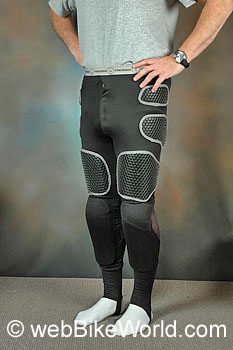
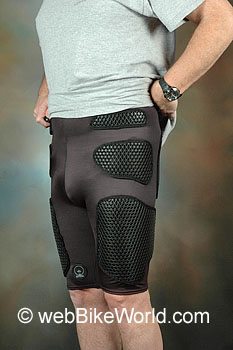
Forcefield Action Pro Pants
TThe Forcefield pants are made with a fabric called “Meryl”, which is claimed to offer “breathability and outstanding comfort”.
The pants include several permanently attached Armourflex panels on the outside of the thighs and along the rear.
A smaller piece of Armourflex is also provided, which is inserted into a pocket by the owner and which is designed to cover the coccyx (lower spine).
I’m not sure why the removable panel isn’t also permanently attached to the outer fabric. It seemed to be located slightly too low in both the size large and medium pants.
The pants have a Velcro fly, but for some reason the Velcro doesn’t extend all the way up to the waistband, leaving a slight gap. This isn’t a problem except when taking a photo! The shorts do not have a fly.
The elastic waistband on the pants ends half-way around the front and it does not extend around the back.
The waistband at the back instead uses a taller section of the Meryl fabric, which is stretchy but doesn’t seem to offer the same amount of hold as the elastic waistband in front. As a result, the pants feel like they creep down in the back slightly when I wear them.
The Forcefield pants are comfortable and the Lycra-type fabric helps provide some support. The pants don’t include corresponding mesh panels like those found in the shirt, so the pants can tend to be slightly warm, although the panels behind the knee armor are made from mesh.
The Forcefield pants meet the EN1621-1:1998, EN1621-2:2003, EN13595-1:2002 and EN340:2003 standards and are available in sizes S, M and L.
I tried both sizes and although they both fit, the medium felt more appropriate to my 35″ waist, 31″ length body.
Forcefield Action Pro Plus Shorts
The pants are also available as shorts; they’re called the Forcefield Action Pro Plus shorts. They’re made from Lycra and they are very easy to wear and feel unobtrusive.
These are a good solution for anyone whose leather or textile pants have knee armor that fits but who desire better hip and thigh protection.
The Armourflex padding is positioned in slightly different locations on the shorts and it’s all permanently attached, which I think helps make the shorts so easy to put on and take off.
The padding over the coccyx is also permanently attached, but it also feels like it’s slightly too low. The elastic waistband continues all the way around the shorts, which is a plus.
Rick wears the shorts under the GiMoto one-piece leather suit, which doesn’t have much padding in the thighs, hips and coccyx. The shorts are available in sizes XS through XL and they meet EN1621-1:1998, EN1621-2:2003, EN13595-1:2002 and EN340:2003 standards.
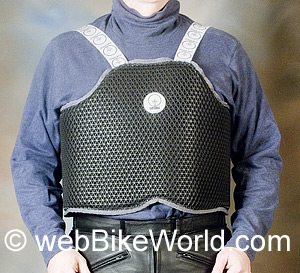
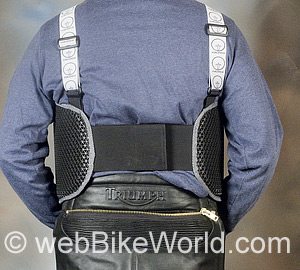
Forcefield Rib Protector
The Forcefield Rib Protector, or Upper Torso Protector, is an interesting product. This is a Level 1 approved protective device that Forcefield says can be used “for those activities where the ribs are particularly vulnerable”.
UPDATE: Our original photos of the model wearing the Rib Protector were incorrect — he was wearing it backwards!
How embarrassing…! But how was I to know that the elastic and Velcro belt goes across the back rather than the front?! See the Owner Comments below for more…
We also learned that the Rib Protector, when worn correctly, is designed to work with a back protector.
The Rib Protector is available in sizes small, medium and large; the size large shown here is too big for me, a medium should fit better.
The Rib Protector has adjustable elastic shoulder straps and a wide, stretchy Velcro belt in front.
This one is so big on me that the Velcro just barely attaches in the front. I’d say the size large should fit chest sizes of 45-46 and above, but overall, it feels a bit like wearing a barrel.
Forcefield Back Protector Insert
Believe it or not, this was the product I was originally looking for when I contacted Motostrano.
The fluff that passes for back armor in most motorcycle jackets is horrendous.
You’d think that the manufacturers would at least offer an extra-cost upgrade to proper back armor. And you might also think that back armor would all conform to similar shapes and dimensions, but this isn’t the case.
I wanted to get a back armor insert that would fit in my 3/4-length winter jacket in addition to my shorter leather and mesh jackets.
The Forcefield Back Protector Insert should be perfect, but I discovered that the back armor pockets on every one of the motorcycle jackets I own are differently shaped and the insert will not fit.
I tried to fit it into the Rev’it, Tourmaster (Cortech), Roadgear and Joe Rocket jackets without success. What’s up with that??
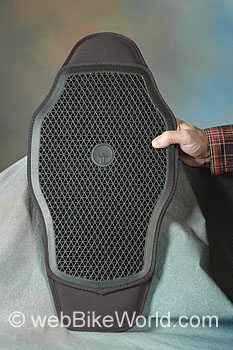
Standardized Protection?
So here’s our challenge to motorcycle apparel manufacturers: how about standardizing on 1) A shape and size for back armor and 2) A standard sized pocket in every jacket to fit the armor?
Every jacket could and should have a standardized pocket that would allow the owner to insert a standard sized back armor insert if desired.
Yes, I know that back armor does come sized (usually S, M and L), but surely the pockets on the jackets could also be sized accordingly, based on the jacket size?
I even discovered that Rick’s GiMoto suit does not have a back armor pocket!
We noticed a Velcro covered opening in the mesh liner of the suit and figured it was for a back protector insert, but when we opened it up we discovered that there was nothing underneath besides the kangaroo leather.
In any case, I haven’t given up; we’re fortunate enough to have a motorcycle leather and clothing tailor nearby and I plan on bringing my jackets in to fit a pocket in each which will allow me to use the Forcefield back protector insert.
The Forcefield Back Protector Insert comes in three sizes and each is also available as a “Sport” version, which is thinner than the original version.
Other than that, the Forcefield product is just as flexible as the dedicated Forcefield back protector with shoulder straps that we reviewed previously.
Forcefield claims that Isle of Man TT road racers Ian Hutchinson (Honda) and Craig Atkinson, (Manx winner) helped with the design of the the back inserts and chest protectors.
Conclusion
Forcefield products are manufactured by a company that seems dedicated to the cause and is focused specifically on the manufacture of high-quality protective armor for motorcyclists and other outdoor activities.
This alone gives me more confidence in the products.
That’s especially since I’m not willing to evaluate them in a crash, so I have to depend on subjective criteria like my comfort level with the company’s claims.
In addition, the Forcefield armor is different than any of the others that I’ve tried and it does seem to offer a higher level of comfort and flexibility.
I wish the shirt had a provision to incorporate the back protector insert and I also wish the fabric had better breathability, but these are probably minor nitpicks, common with this type of equipment.
The bottom line is whether or not the product will protect the rider when it’s needed. I feel more comfortable and secure wearing the close-fitting Forcefield armored clothing than I do with the armor that is built in to most of the other motorcycle clothing I own.
See Also: Forcefield Pro Shirt Review | Forcefield Pro Sub 4 Back Protector Review | Forcefield Sport Lite 2 Review
More webBikeWorld:
| wBW Review: Forcefield Motorcycle Armor | |
|---|---|
| Manufacturer: Forcefield | Made In: UK |
| Colors: Black. | Review Date: December 2006 |
| List Prices (2006): UK prices include VAT and shipping; Shirt – £139.99 ; Pants – £89.99; shorts £74.99; Rib Protector – £49.99; Back Protector Insert – Pro £29.99, Sport £24.99. US prices don’t include shipping or applicable sales tax; Shirt – $225.00 ; Pants – $160.00; shorts $95.00; Rib Protector – $75.00; Back Protector Insert – Pro $125.00. | |
Note: Item provided by a retailer, distributor or manufacturer with these Terms and Conditions.
Owner Comments and Feedback
See details on submitting comments.
From “J.R.K.” (7/10): “I noticed your article regarding T-Pro products and the following line:
“Forcefield says that a triple layer version of Armourflex is also available, but I can’t find it listed on their website, so I’m not sure what the difference is between it and the standard armor that comes in the shirt.”
As I understand it, the triple layer is available in the shirt and pants although apparently exclusively here in the US. Through their US Importer Johnson Leather.
It was originally a special request by a customer here, and became popular so it is now an option.
Love the review.“
From “S.C.” (7/09): Sent an “email conversation with Richard Andrews from ForceField Performance. Basically, some of their chest protectors conform to EN Standard 14021:2003, which is a Stone Sheild or deflector.
SATRA confirms that back and chest protectors can be certified to EN1621-2:2003. Mr. Andrews has noted that their Action Shirt’s chest pad conforms to EN1621-1:1998and thus is looking into removing the EN1621-2:2003 certification for that product, since it also does not come with a back protector.”
From “T.L.” (2/09): “When writing about the Rib Protector, you note (in the Update above) that:
“Our original photos of the model wearing the Rib Protector were incorrect — he was wearing it backwards! How embarrassing…! But how was I to know that the elastic and Velcro belt goes across the back rather than the front?!”
However, when you go to the Forcefield website here, you will note that the model has it on the way you originally had depicted in the pictures with the Velcro on the front and not on the back.
So I am wondering which way is the correct way to wear it?”
Editor’s Reply: Our review of the Forcefield armor was published in 2006, and I recall getting an email from the U.S. distributor telling me that the armor in the photo was backwards.
So I don’t really know, but honestly, I think it can be worn either way. They should have made it more obvious, or labeled the product in a way that would tell the owner!
I think if you’re wearing it for motocross/off-road, you’d want the armor facing forward to protect against flying rocks. Motocross riders use chest protectors, so the Forcefield armor would probably work for this.
If you’re riding on the street, turning it around might provide extra back protection. Actually, now that I think about it, they should be using this “reverso” feature as a marketing and sales point!
T.L. Follow-up: Apparently they were a step ahead of your idea to market it both ways, I found a link where the same T-Pro model is wearing the rib protector both ways….
From “J.F.”: “I contacted Tpro … Thought you might be interested that they confirm manufacture of Joe Rocket (Back Inserts) and Halvarssons (Back Protectors)…”
From “J.F.”: “Very detailed review on the Forcefield Armor. I bought the Shirt, Pants and back protector a few weeks ago. I must say we disagree on several key areas.
I love the back protector, though it does tend to sag after a while riding due to the lack of secure adjustment systems meaning you need to adjust it every time you use it.
The knee/elbow (which are identical pieces) and shoulder armor however is horrible in my opinion. I find them very uncomfortable against the bones present in my joints, and after a couple hours wearing them find it causes a sore spots in each of these areas. I retired them to my closet never to be seen again.
II think this is because of a lack of padding in the inside of the armor itself, it’s very rigid. I much prefer the armor in my Alpinestars or Icon jackets. I guess I just wanted to let the other readers out there know their mileage may vary with this product.”
From “R.T.H.”: “Great review on the Forcefield product offering. I recently purchase the Forcefield Action shorts which is the same material at the Shirt you reviewed. Think the difference in the shorts is the newer ones have removable armor. Have been very pleased with the comfort of the shorts.
Was concerned about the heat since I ride in Florida but have found the shorts to be very cool. Also like the greater level of protection under my bike pants. Did purchase loose Forcefield armor for jacket shoulders, but agree that wearing the shirt would offer better protection. Think that will be the next upgrade.
Other WebBikeWorld Accessories Posts


